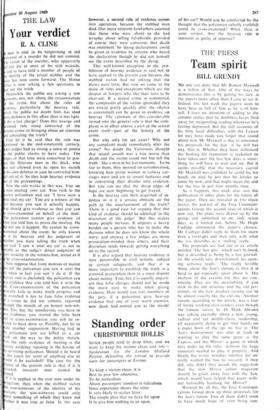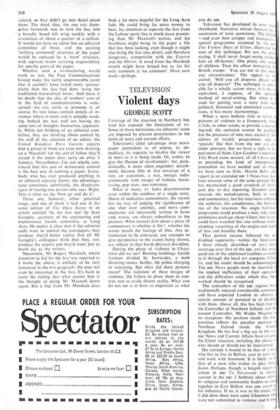THE PRESS
Team spirit
BILL GRUN DY
No one can deny that Mr Robert Maxwell is a fellow of flair. One of the ways he demonstrates this is by getting his face as the papers more often than I care to see it. Indeed, this last week the papers seem to have been as full of him as he is of him- self. I have no intention of adding to the column inches that he doubtless keeps filed away for invigorating reading whenever he's feeling depressed. But the full accounts of his little local difficulties with the Lease° lot may have made you forget that round about now Mr Maxwell is due to announce his proposals for the Sun if he still has any, that is. Whether they have withstood the bashing his reputation is reckoned to have taken over the last few days is some- thing we will have to wait and see. But it seems possible that the necessary capital Mr Maxwell was confident he could lay his hands on may be just that bit harder to come by now, and that might mean the end for the Sun in just four months time.
As it happens, this week also sees the publication of other plans for the future of the paper. They are revealed in The Open Secret, the journal of the Free Communi- cations Group, the second issue of which is now out. The plans were drawn up by the group and submitted to IPC only seven days, as it turned out, before Mr Hugh Cudlipp announced the paper's closure. Mr Cudlipp didn't reply to them for more than a fortnight and then only with what the ucc describes as a 'stalling' reply.
The proposals are laid out in an article entitled 'The Sun dies', which isn't by-lined, but is described as being by a Sun journal- ist. He sounds very disenchanted; his open- ing sentence reads: 'The really terrible thing about the Sun's closure is that it is hard to get especially upset about it.. His analysis of the reasons for this are con- vincing. They are the inevitability, if you stick to the old structure and the old per- sonnel, of the new product turning out to be almost exactly like the old one. Another reason, according to the article, was a fear of losing working-class readers, even though the famous survey by Dr Mark Abrams was talking excitedly about a new, young, radical and yet middle-classy readership, all apparently dying to get their hands on a paper born of the age we live in. The Sun's management was also at fault in wanting to play the same game as the Express and the Mirror—a game in which they make up the rules -without the huge resources needed to play it properly. And finally the writer wonders whether the IPC really wanted the Sun to succeed; if they did, why didn't they accept the suggestion that the new Mirror colour magazine should be given away free with the Sun, which would have helped that paper with- out noticeably harming the Mirror?
Worried by all this, the Free Communi- cations Group drew up three proposals for the Sun's future. Two of them didn't seem to have much hope of even being con- sidered, so they didn't go into detail about them. The third idea, the one Fcci them- selves favoured, was to turn the Sun into a broadly based left wing weekly, with a circulation of about a quarter of a million. It would not have an editor but an editorial committee of three, and the existing 'military command' structure of the paper would be replaced by a 'team' structure, with separate teams carrying responsibility for specific parts of the paper.
Whether such a re-structuring would work or not, the Free Communications Group make the fairly unanswerable point that it couldn't have failed more spectac- ularly than the Sun had done 'using the traditional hierarchical form'. And there is no doubt that the idea of workers' control in the field of communications is wide- spread—the FCG exists to promote it, of course. Its two issues contain details of in- stances where it exists and is actually work- ing. Indeed the Sun staff are having the same sort of thoughts themselves, apparent- ly. While not thinking of an editorial com- mittee, they are thinking about control by the staff of the selection of an editor; the United Kingdom Press Gazette reports that a group of them are even now drawing up a 'blueprint' for the sort of fellow they'll accept if the paper does carry on after 1 January. Nevertheless, I'm not wholly con- vinced that this sort of democratic control is the best way of running a paper. Every- body who has ever produced anything in an editorial capacity knows the advantages (and sometimes, admittedly, the disadvant- ages) of having one person who says 'Right. This is what we do. Now go and do it'.
There are, however, other potential snags, and one of them is laid out in the same edition of The Open Secret in an article entitled 'As the Sun sets' by Sean Geraghy, secretary of the engineering and maintenance liaison committee at Long Acre. He makes it clear that if the editorial staffs want to control the newspapers they produce, they'd better realise that all Mr Geraghy's colleagues think that they, too, produce the papers and they'd want just as much say as the writers.
Meanwhile, Mr Rupert Murdoch, whose intention to bid for the Sun was reported as I wrote the above, is unlikely to be very interested in the FCG proposals. He may not even be interested in the Sun. It's hard to resist the feeling that what excites him is the thought of doing Mr Maxwell down again. But a bid from Mr Murdoch does
look a lot more hopeful for the Long Acre lads. He could bring far more money to bear, his intention to separate the Sun from the Labour party line is much more promis- ing than Mr Maxwell's notion, and his brashness might bring to the paper a life that has been lacking, even though it might also bring the Sun into direct, and therefore dangerous, competition with the Express and the Mirror. A word from the Murdoch mouth might have helped but so far his only comment is `no comment'. More next week—perhaps.



































 Previous page
Previous page